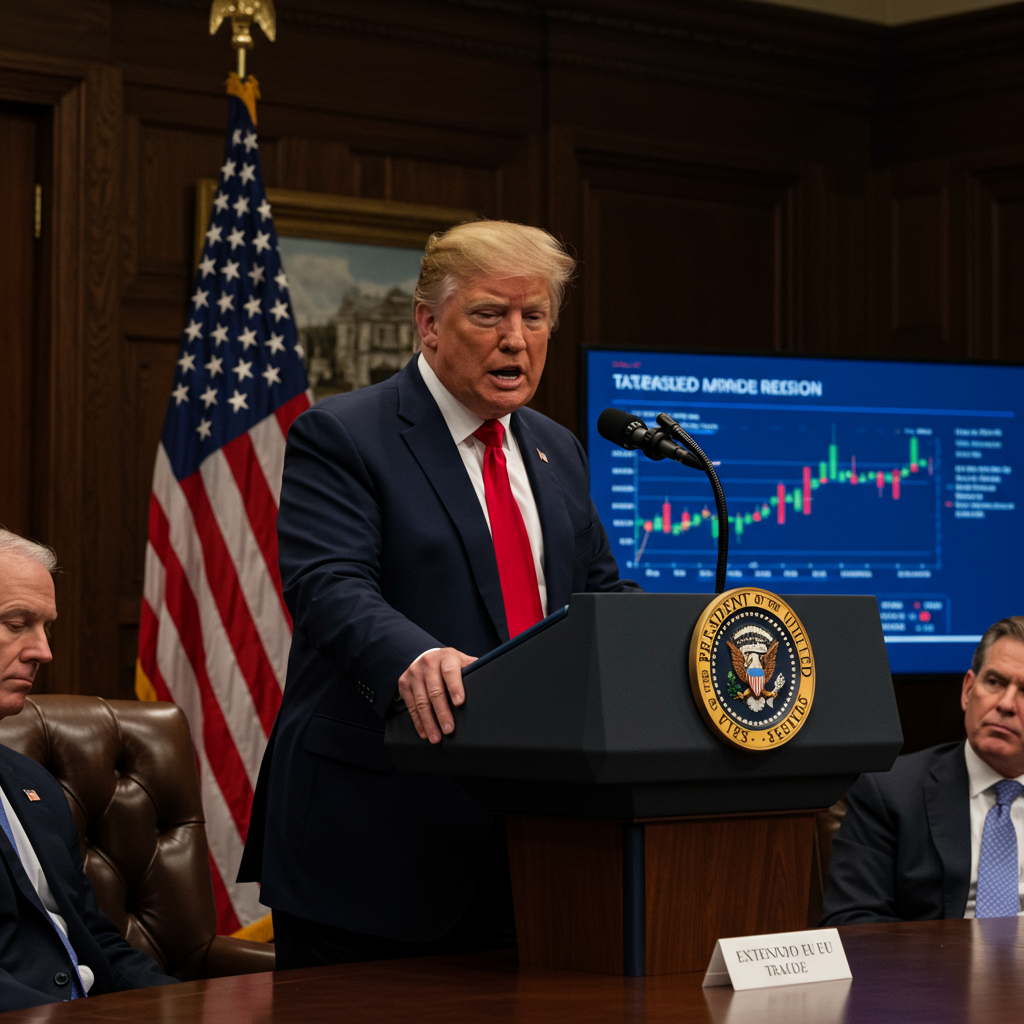Former U.S. President Donald Trump has publicly accused two of America’s largest financial institutions, JPMorgan Chase and Bank of America, of rejecting him as a customer. These dramatic allegations, first aired in a wide-ranging interview, have reignited a heated debate surrounding claims of “de-banking” targeting conservative clients and other groups. Trump’s assertions suggest a deeper issue of political discrimination within the financial sector, a sentiment echoed by various conservatives, cryptocurrency executives, and religious organizations who also report unfair account closures. This high-stakes dispute underscores the complex interplay between financial regulation, political pressure, and corporate responsibility.
The Heart of the Allegation: Trump’s Claims
Donald Trump vividly recounted his experiences with the banking giants. He stated that JPMorgan Chase issued him an abrupt 20-day notice to move “hundreds of millions of dollars in cash” from their accounts, without specifying the exact timeline of this event. Following this, Trump claimed he approached Bank of America with the intention to “deposit a billion dollars-plus,” only to be explicitly denied an account by CEO Brian Moynihan himself. Moynihan reportedly told Trump, “We can’t do it.”
These rejections, as described by Trump, forced him to distribute his substantial funds across numerous smaller banks. He detailed placing sums like “$10 million here, $10 million there” to manage his finances. While Trump mentioned his business interests, likely referring to his extensive real estate and hospitality conglomerate, it remained unclear whether these incidents involved personal, business, or combined accounts. He explicitly framed these rejections as severe discrimination, stating, “The banks discriminated against me very badly.”
Banks Respond: Compliance or Coercion?
In the wake of Trump’s claims, the accused financial institutions have issued their own statements. JPMorgan Chase denied closing accounts for political reasons. A spokeswoman stated, “We don’t close accounts for political reasons, and we agree with President Trump that regulatory change is desperately needed.” This indicates a shared perspective on the need for regulatory reform, even while disagreeing on the underlying reasons for account closures. Bank of America, on the other hand, largely declined to comment directly on Trump’s specific allegations, although they had previously denied making banking decisions based on political beliefs in January.
The Regulatory Tightrope
Banks find themselves navigating a precarious path. They must comply with stringent federal laws aimed at preventing financial crimes, notably the 1970 Bank Secrecy Act (BSA) and other anti-money laundering (AML) regulations. These laws require financial institutions to report suspicious activities and perform due diligence on customers. Banks also face intense regulatory pressure, particularly concerning industries perceived as high-risk for money laundering or fraud, such as cryptocurrency.
However, a trade group representing major banks, the Bank Policy Institute, has publicly pointed to “regulatory overreach” as the root cause of the wider “de-banking” problem. A spokesman expressed hope that any forthcoming executive action would reinforce progress by directing regulators to confront the “flawed regulatory framework” that initially sparked these concerns. This suggests a systemic issue where banks feel compelled to take actions that might appear discriminatory due to broad regulatory directives and the significant penalties for non-compliance.
The Broader De-Banking Debate
Trump’s experience is not isolated. For years, various groups have reported being “de-banked” by large U.S. financial institutions. Conservatives frequently claim they are unfairly denied services due to their political views. Similarly, crypto executives and religious organizations have raised concerns, attributing account closures to perceived high-risk classifications or ideological biases. This widespread sentiment suggests a systemic challenge at the intersection of financial services, regulatory compliance, and societal values.
The issue puts banks in a difficult position. They risk further angering a vocal segment of the population and potentially a future administration by airing grievances that resonate with their supporters. Simultaneously, many banks have benefited significantly from efforts to roll back certain regulatory rules, creating a complex political and business landscape.
Legislative and Executive Action on the Horizon
Responding to these pervasive claims, the Trump administration has indicated plans for an executive order targeting alleged discrimination by banks. A draft version of this order, reported by The Wall Street Journal, would direct regulators to investigate whether banks have violated existing laws, such as the Equal Credit Opportunity Act, antitrust laws, or consumer financial protection laws, by dropping customers for political reasons. The proposed order could authorize various disciplinary measures, including monetary penalties and consent decrees, against institutions found guilty of “politicized or unlawful debanking.” Regulators would also be mandated to refer alleged violations to the Department of Justice.
This potential executive action underscores a serious effort to address what many perceive as a growing threat to financial access based on non-economic factors. The White House has not yet provided specific details regarding the timing or content of this anticipated executive action, but its mere consideration highlights the severity of the issue.
Shareholder Activism and Corporate Accountability
Adding another layer to this complex narrative, the National Legal and Policy Center (NLPC), a corporate watchdog group, has actively pursued the “de-banking discrimination” issue through the shareholder proposal process with both JPMorgan Chase and Bank of America.
In 2023, NLPC submitted a shareholder proposal to JPMorgan Chase, requesting a report on federal government requests to close customer accounts. This action was prompted by reports of conservatives, including former Kansas Governor Sam Brownback, allegedly being de-banked by Chase and other large banks. However, the Securities and Exchange Commission (SEC) under the former Biden administration permitted Chase to exclude this proposal from its annual meeting, deeming it not a “significant-enough issue.” The NLPC contrasted this decision with JPMorgan’s substantial $75 million settlement related to its alleged aid to Jeffrey Epstein, suggesting a double standard in what constitutes a “significant issue.”
For Bank of America, NLPC submitted a proposal for the 2025 annual meeting seeking disclosure on the company’s policies regarding sharing customers’ private information with government agencies. This initiative followed critical reports from the House Judiciary Committee concerning several large U.S. banks, particularly Bank of America, for allegedly providing financial and transaction data to federal authorities without sufficient legal justification, especially after the January 6, 2021, incident at the U.S. Capitol. Despite these concerns, the SEC under the Trump administration also allowed Bank of America to exclude NLPC’s proposal, drawing further criticism.
Market Implications and Future Outlook
While shares of both JPMorgan Chase and Bank of America dipped slightly (over 1%) in afternoon trading following Trump’s initial statements, the broader financial implications of this debate extend beyond immediate market reactions. The threat of an executive order and the ongoing scrutiny from public figures and activist groups create an environment of uncertainty for major financial institutions. Banks face the challenge of balancing their compliance obligations under federal law with the political sensitivities of their diverse customer base. This situation highlights the fine line financial institutions must walk to maintain trust, comply with regulations, and avoid becoming embroiled in political controversies.
Frequently Asked Questions
What exactly are Donald Trump’s claims against JPMorgan Chase and Bank of America?
Donald Trump alleges that both JPMorgan Chase and Bank of America rejected him as a customer, forcing him to bank with smaller institutions. He claims JPMorgan Chase gave him 20 days to move “hundreds of millions of dollars,” and Bank of America refused a “billion dollars-plus” deposit. Trump attributes these rejections to regulatory pressure from the Biden administration and broader political discrimination against conservatives.
Which regulatory bodies are involved in investigating alleged bank discrimination?
The proposed executive order from the Trump administration would direct various bank regulators to investigate financial institutions for political bias. This could include agencies responsible for enforcing laws like the Equal Credit Opportunity Act, which prohibits discrimination in credit transactions, and potentially other consumer financial protection and antitrust laws. These investigations could lead to fines or other disciplinary actions.
How might alleged political de-banking affect average consumers or businesses?
If alleged political de-banking becomes a widespread practice, it could lead to concerns about financial access and fairness for average consumers and businesses based on their views or affiliations, rather than creditworthiness or risk. This could force individuals and companies to seek services from smaller banks, potentially limiting financial options and creating a two-tiered banking system based on perceived political alignment. It also raises questions about data privacy and the sharing of customer information with government agencies.
Navigating the Intersection of Finance and Politics
The debate surrounding Donald Trump’s banking claims and the broader issue of “de-banking” is a significant development at the intersection of finance, politics, and civil liberties. It challenges the traditional perception of banking as a neutral, service-oriented industry, pushing it into the complex arena of political influence and regulatory power. As the discussion evolves and potential executive actions loom, financial institutions will continue to face intense pressure to balance strict compliance requirements with accusations of bias, ultimately shaping the future landscape of financial services in America.


